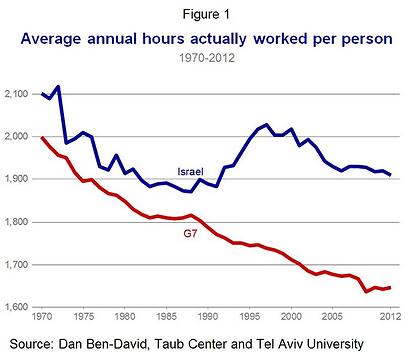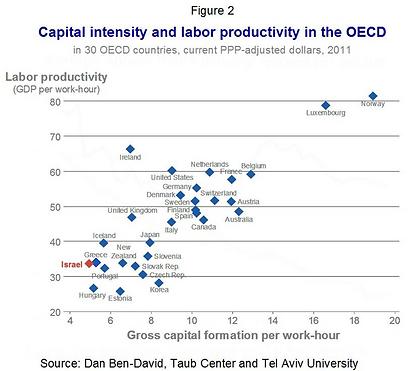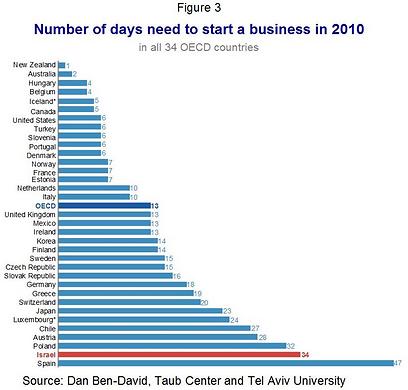Taub Center study reveals new findings on primary factors underlying Israel's low labor productivity, including longer working day, low capital investments, cumbersome bureaucracy
Ynetnews
Wages are highly dependent on the amount produced per hour – or what is commonly referred to as labor productivity. In the study, Taub Center Executive Director Prof. Dan Ben-David looks at a host of key factors surrounding and underlying Israel’s problematic productivity. For example, the number of annual hours worked per person in Israel and in the G7 fell until the mid-1970s. "While fewer Israelis participate in the labor force than is common in the leading Western countries, those who do work many more hours each year,” says Prof. Ben-David.  "In fact, employed Israelis work have worked more hours than employed workers in the G7 countries since the mid-1970s, and the gaps in work hours have only grown: The number of hours worked in the G7 has fallen steadily for four straight decades while the number of annual hours worked by the average Israeli in 2012 – which fluctuated broadly in recent decades and has been falling since the late 1990s – roughly equaled the number of hours worked over three decades earlier. "Though Israelis who do participate in the labor force work more hours than workers in the leading western countries, their productivity per hour worked is considerably less, and falling further and further behind (in relative terms) the G7 labor productivity.”  While there are undoubtedly important factors that are idiosyncratic to different business sectors, there are also a number of related economy-wide determinants. Capital plays a key role in spurring productivity – and here, as Ben-David finds, Israel has major problem. In addition to the problematic level of the country’s human capital infrastructure and to the multi-decade neglect of its transportation infrastructure, Israel’s capital formation is at the low end of the OECD. Increasing national burdenCapital and labor are considered substitute factors of production. An increase in the capital stock improves labor productivity, which is why it is not a coincidence that there exists such a strong positive relationship between capital formation, in general, and labor productivity.So, as Ben-David notes, "it should come as no surprise that a country with relatively low national levels of physical and human capital is exhibiting problematic productivity growth at the national level." In addition to all of the above factors that hinder Israel’s productivity growth, there is also the country’s cumbersome governmental bureaucracy, requiring the diversion of even more resources away from actual production of goods and services, lowering productivity even further. For example, the number of days needed to start a business in Israel (34 days) is the second highest in the Organization for European Economic Co-operation and Development (OECD) – two and a half times the OECD average of 13 days.  The high bureaucratic costs imposed on both Israeli and foreign firms interested in doing business in Israel reduce the competition so essential for creating the pressure to invest, innovate, and produce better goods and services at lower cost. Though the regulation has been somewhat reduced, it is still substantial and it continues to extracts a high price in terms of productivity. "The country’s small domestic market is concentrated in the hands of too few individuals and it suffers from insufficient competition – a crucial factor in spurring physical and human capital investments necessary for productivity growth," says Prof. Dan Ben-David. "All of these factors combine to yield higher domestic prices that reduce the economic viability and attractiveness of Israel’s economic environment even more. |
Sunday, September 15, 2013
Israelis work more hours than in West
Subscribe to:
Post Comments (Atom)
No comments:
Post a Comment